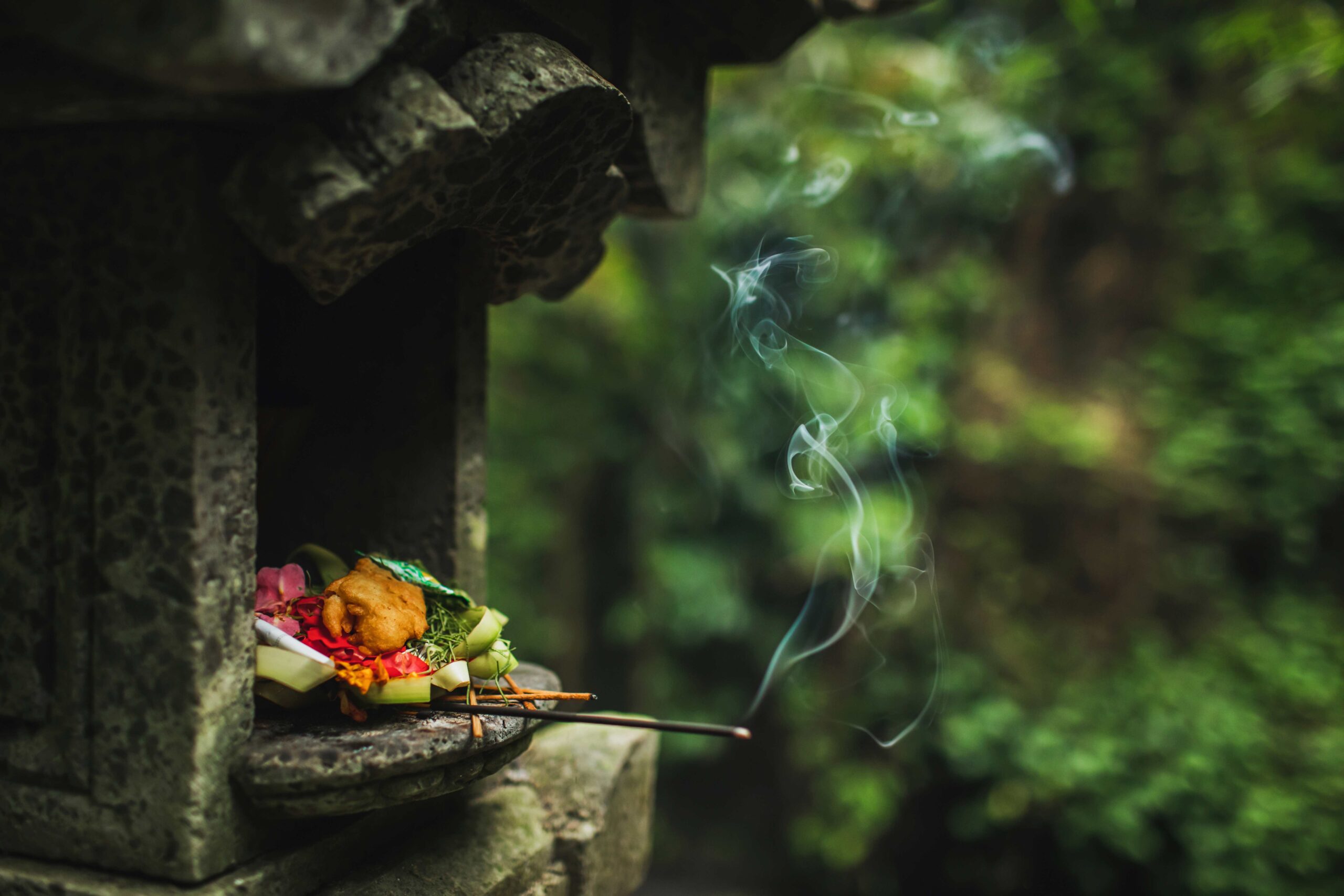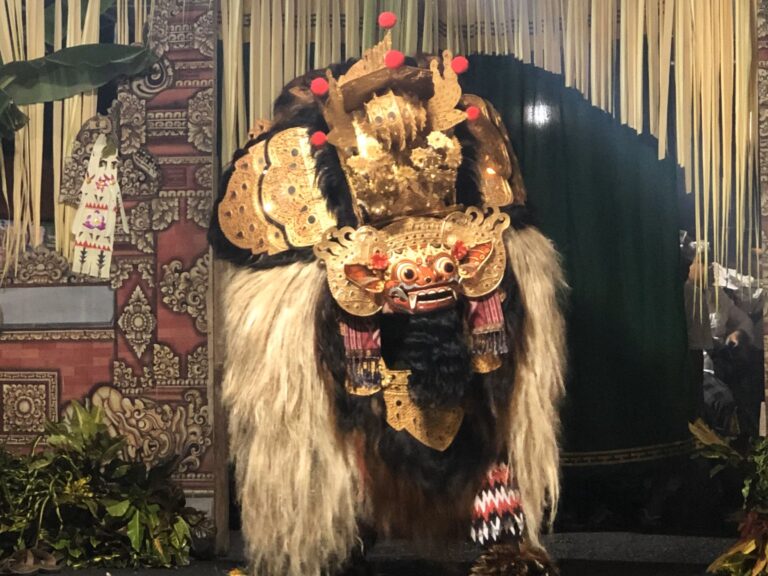Bali is often called “the land of the gods” by visitors and it’s true that Balinese culture has a very interesting relationship with gods.
Even though Bali is Hindu, Balinese Hindus don’t just worship Indian Hindu deities and there are a lot of interesting quirks about gods in Bali.
Not least, the legal requirement for every Balinese religion to have only one supreme deity.
A Quick Introduction To Balinese Hinduism
Balinese Hinduism is not the same as Indian Hinduism though, of course, Balinese Hinduism was inspired by Indian Hinduism.
You will find that the local form of the Hindu faith is an amalgamation of Hinduism, the original animist faith (this is a form of ancestor worship called Pitru Paksha in modern terms) and with an enormous amount of respect for the Bodhisattva (the saints of Buddhism).
Bali is unusual in this respect. Nearly all of the Indonesian archipelago is Muslim and 86% of all Indonesians follow Islam.
However, 87% of Balinese are Hindus which makes it the only Hindu-majority region in Indonesia.
Key Beliefs Of Balinese Hinduism – The Agama Hindu Dharma
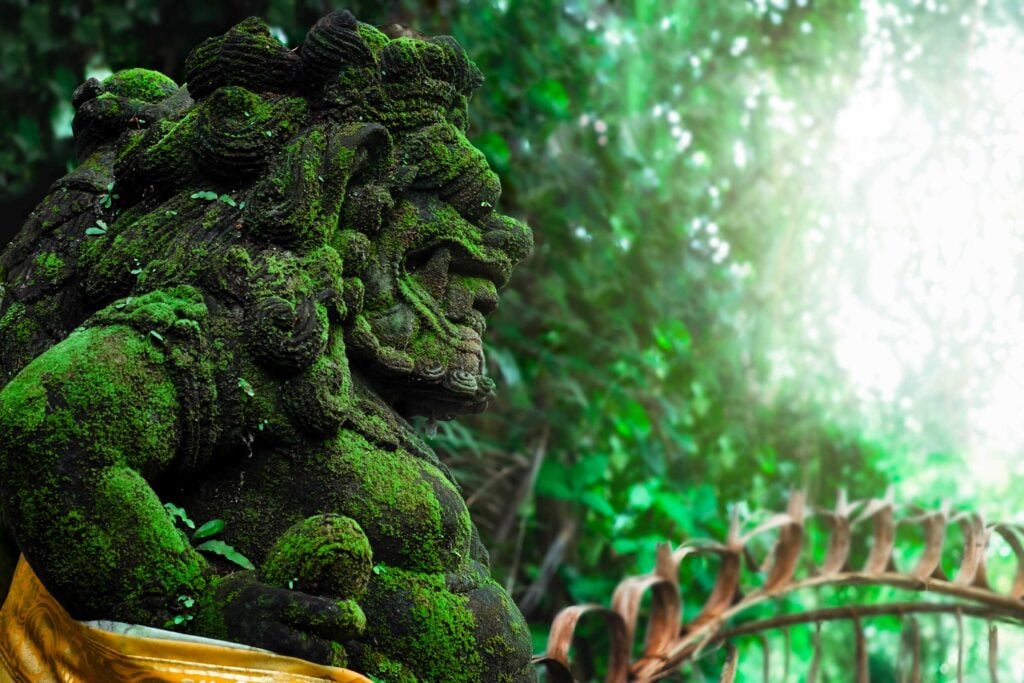
Since the change of Balinese Hinduism to focus on one god, the official name for the religion is Agama Hindu Dharma but in Bali, it may still be called by some of its older names including Agama Tirta, Siwa, Buda, Tirta, Trimurti, etc.
It’s worth noting that Tirta and Trimurti are corruptions of the Indian words Tirtha (which is a sort of pilgrimage undertaken to one temple that specializes in purification or water rituals) and Trimurti which is the Hindu trinity – Brahma, Vishnu and Shiva.
There are strong Indian influences on the local Hindu worship and you can find them most clearly in the epic stories and use of the Puranas (other forms of Hindu literature).
However, there are other uniquely local touches including many of the festivals and local customs associated with animism (these are for “hyangs” the ancestor spirits).
One thing that exists in Balinese Hindu culture that doesn’t exist on any real basis in the Indian culture is animal sacrifice.
The most important sacred texts of this religion are the Vedas (the oldest Hindu scriptures and the oldest texts written in the Vedic language of India) and the Upanishads (these are recent, but also Vedic, texts that modify some of the core concepts laid out in the Vedas.
There are many Hindu Puranas and Itihasa (other Hindu epics) in use in Indian Hindu practice but in Indonesia, there has been more of a focus on two particular stores – the Ramayana (the story of the life of Prince Rama) and the Mahabharata (the story of the Kurukshetra War).
There are also four paths to the spiritual realm in Indonesian Hindu worship that are similar to those followed in India, together they are known as the Catur Marga:
Bhakti Marga – this is the path of devotion to the gods
Jnana Marga – this is the path of knowledge
Karma Marga – this is the path of works
Raja Marga – this is the path of meditation
Each Hindu chooses which path to follow for themselves and, in Bali, the most popular choice is the Bhakti Marga.
One Supreme God
The Constitution of Indonesia which was written in 1945 specified that all Indonesians were to have “freedom of religion”.
Then, as often happens, things changed and in 1952, the Indonesian Ministry of Religious Affairs was overtaken by local religious conservatives.
This group opted to constrain the definition of “religion” in Bali and they decided that only monotheistic religions would be considered “religions” at all and worse, the nation would deny citizenship to anyone who was not part of an officially accepted monotheistic religion.
This meant that as far as the Ministry was concerned, Hindus were now “people without a religion” and could be converted to other religions.
Balinese Hindus are a pragmatic people and, in response, they simply declared their form of Hinduism to be monotheistic and thus eligible to be “agama” (an official religion of Indonesia).
This ensured that the Hindu faith would become one of the official faiths of Indonesia (there are five such faiths, the others are Islam, Buddhism, Protestantism and Catholicism).
To make this work for the Ministry, they declared that the “undivided one” would be the all-pervading god for the Ministry.
All other gods here on the island are now officially just different manifestations of the same god.
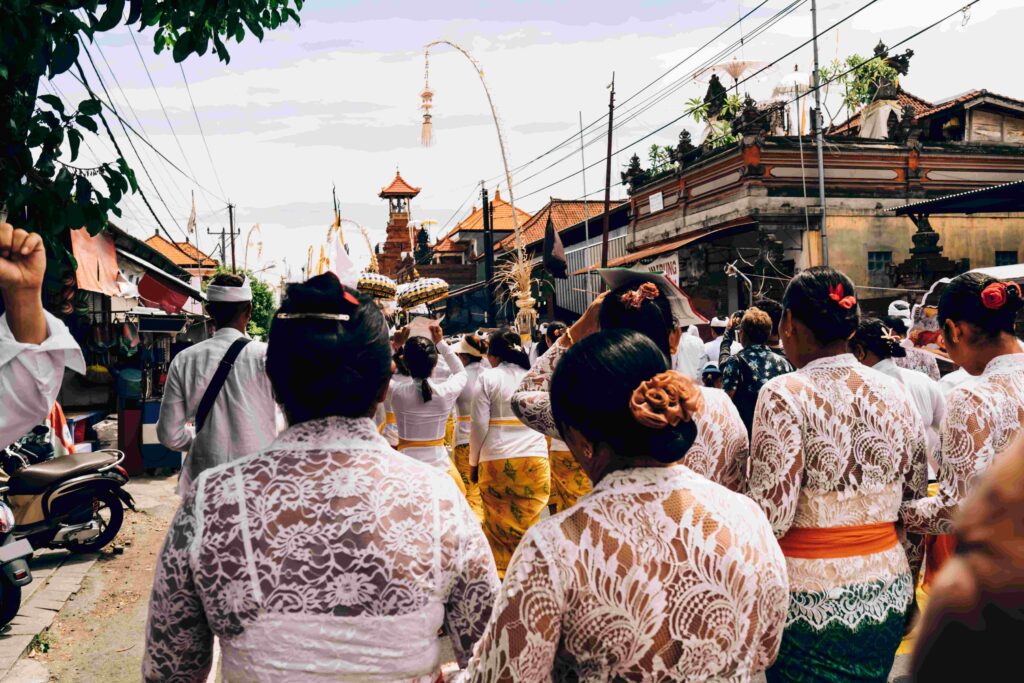
The Hindu Gods Of Bali
So, it’s important to remember that each God is now considered to be the same god, just in a different form presented to the Balinese people.
Ida Sanghyang Widhi Wasa – The Undivided One
Ida Sanghyang Widhi Wasa is also known as the Achintya (this is drawn from Sanskrit and means unimaginable or inconceivable), Sang Hyang Widh Wasa (from Balinese and means “the divine order” and Sang Hyang Tunggal (also from Balinese and means “the divine oneness”).
It’s fair to say that, from a metaphysical perspective, this god offers a similar function to the Brahman in the Indian faith.
The Balinese associate this god with emptiness (the origin of the universe) and with the sun god (he is often pictured in a human-like form with flames bursting from him).
It’s worth noting that the term Sany Hyang Widhi Wasa was said to mean “God Almighty” when the Balinese were trying to persuade the Ministry of Religion and early missionaries that they focused their attention on a single deity.
Dewa Brahma – The Creator And Administrator Of All Knowledge
Dewa Brahma is the “four-faced God” and while the Balinese see Sang Hyang Widhi Wasa to be the chief of the gods, Brahma is the god of creation and origin in Indian folklore.
He is said to have created the heavens, the Earth and the universe as a whole as a place for his creations to live in a perfect place.
He is married to Dewi Saraswati the goddess of literature, wisdom and art.
His main temple in Bali is the Pura Desa.
Dewa Vishnu – The Preserver Of Life
Vishnu is usually pictured on his mount, the Garuda, a massive bird-like creature (you can see the biggest Garuda statue in Indonesia at the Garuda Wisnu Cultural Park here in Bali).
Life is Vishnu’s to give and he has the reputation of being one of the most merciful gods in the Balinese pantheon.
He is married to Devi Sri, the goddess of rice and fertility, and supported by the goddess of joy and wealth, Dewi Lakshmi.
His main temple in Bali is Pura Puseh.
Dewa Shiva – The Destroyer And Cleaner Of Creation
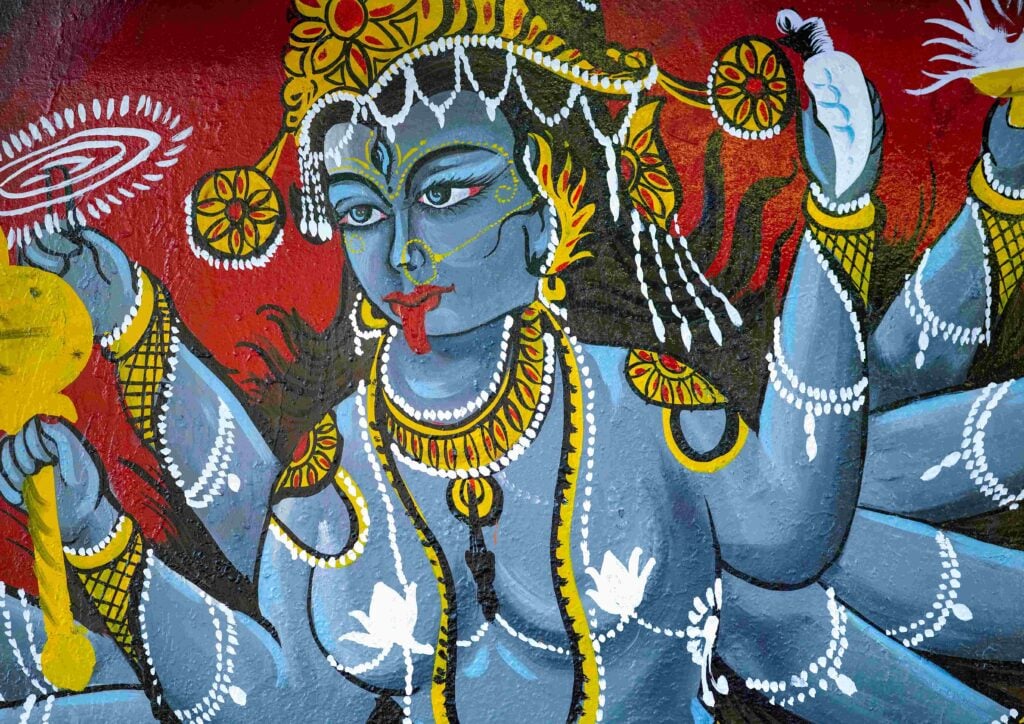
When Vishnu’s protection lapses, Shiva is there to close the cycle of their life.
He cleanses the world of evil spirits and renews the Earth with each cycle.
Many say that he is the leader of the gods and a great teacher. He is worshipped at the temple of Pura Dalem.
Dewi Durga (Dewi Parwati/Dewi Uma) – The Child Eating Witch
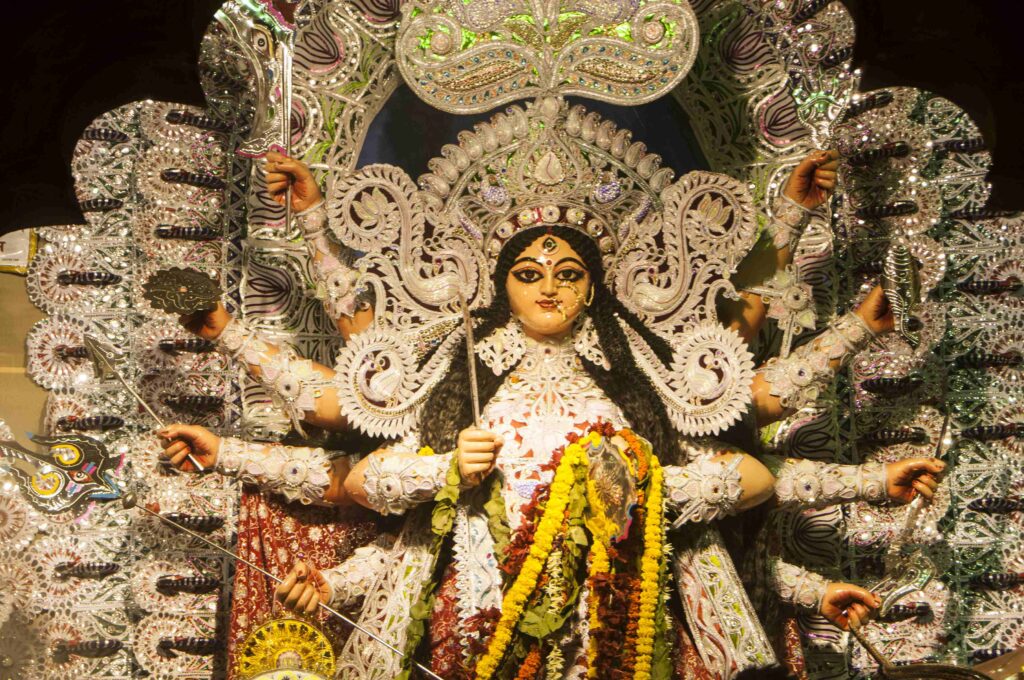
Durga is one of the personal manifestations of Dewi Parwati, Shiva’s wife.
She was once, Dewi Uma, but when the god Shiva retreated for a long period of meditation he entrusted her with the care of their child.
For some reason, Dewi Uma found that she had been gripped by an urge to taste blood and murdered their child and ate it.
Shiva punished her by turning her into Dewi Durga, the child eating witch, and she was required to guard the cemeteries of Bali against harm.
Sometimes, in her most evil form, Rangda, she brings curses of sickness and death to the living Balinese.
Bhoma – The Protector And Judge
You can find Bhoma on nearly every door of every temple in the land. It’s this god’s job to watch over the people and places of purity and protect them from those who would do harm.
It’s said that his face looks welcoming to the pure of heart but terrifying to the would-be evil-doer.
Dewa Ganesha – The Elephant-Headed God
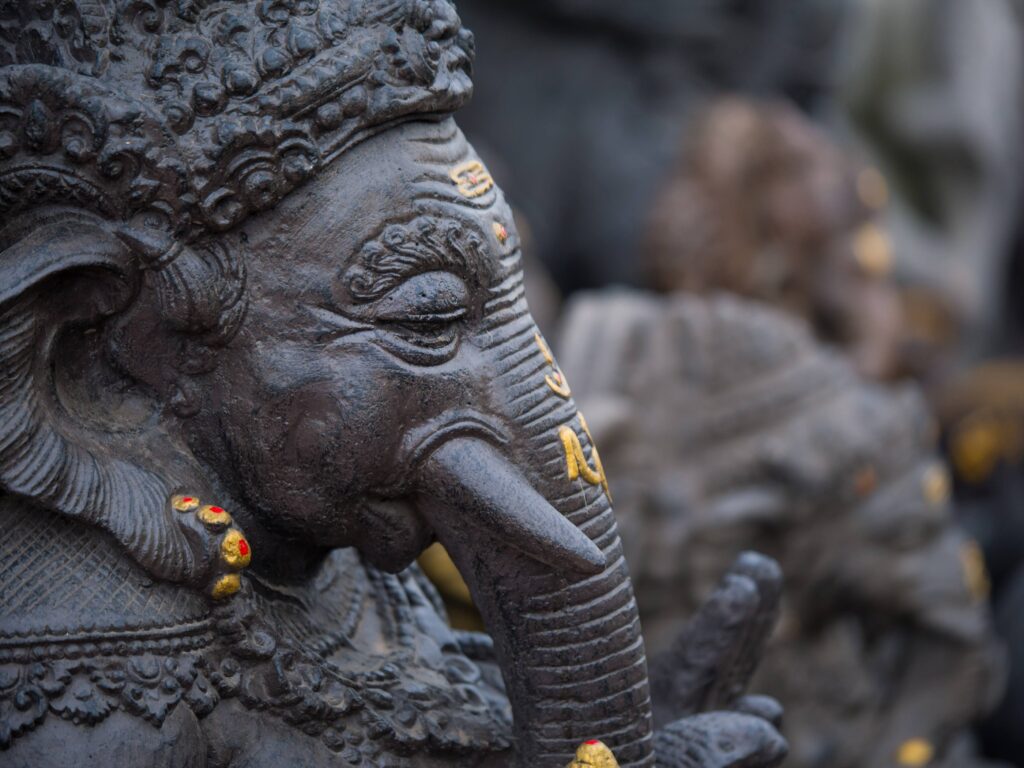
This highly-educated god is the son of Shiva and Parwati. He had a tragic early life when he was instructed to protect his mother’s privacy while bathing.
Unfortunately, he stood before the aspect of Shiva God, who did not know his own son and the god was not impressed, he knocked Ganesha’s head clean off his shoulders!
When his mother remonstrated with his father, he breathed life back into his son and gave him a new head, one from an elephant that he’d just killed.
Balinese people pray to Ganesha for help with their future endeavours and to protect the most important parts of the island.
Dewi Danu – The Lake Goddess

If you visit the temple of Pura Ulun Danu Bratan, you will be visiting the home of this water goddess who is unique to the faith of Bali.
It is believed that she brings life to the whole island and every Balinese person reveres her.
Allah (The Muslim & Christian God)
Of course, while 87% of Balinese may be Hindu, a large number are not and Allah is probably the most significant non-Hindu god on the island.
This is, of course, the Arabic word for the “God” that is shared between the Abrahamic faiths – Islam, Christianity and Judaism (however, Judaism is not recognized as an official faith in Indonesia, and there only appears to be about 200 Indonesian Jews in total).
Buddha
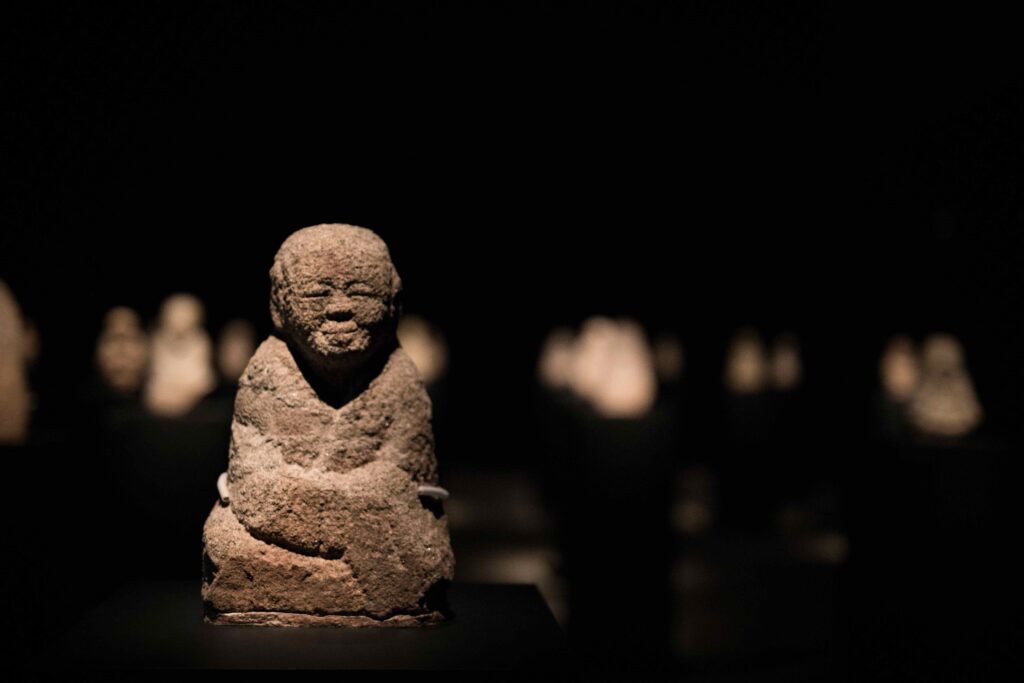
Many would argue that Buddha is not a God and, in fact, that Buddhism is not so much a religion as a philosophy.
However, in Indonesian Buddhism, the Buddha is recognized as a god (because this qualifies it as a monotheistic faith) and Buddhism is a formal religion of Indonesia.
Confucius
Confucianism is popular with some groups of Indonesians of Chinese descent, it’s one of the strangest cases of religion here.
It’s not entirely clear whether it is considered a formal religion in the country (some laws say “yes”, some say “no”) and there is an even bigger debate than with Buddhism as to whether Confucianism is a religion at all with many seeing the faith as a set of life principles rather than worship.
However, while the Confucians may make up less than 3% of the population here in Indonesia, they’re among the most wealthy people and that means they get a certain amount of leeway to do their own thing as long as they don’t start trying to convert other faiths.
One other interesting thing is that they celebrate Chinese New Year in Bali and in Indonesia as a whole.
Chen Fu Zhen Ren
Chen Fu Zhen Ren is an ancestor spirit of Balinese Chinese people and is worshipped by a small group of followers in both Bali and Java.
It’s worth noting that it’s not an official religion of the nation but you can find three temples of this faith on the island, including the famous Ling Yen Gong (Ling Gwan Kong) Temple in Singaraja.
It’s said that Chen Fu Zhen Ren was originally a slave who walked on water from the slave shape he was held captive on to freedom and won the freedom of the other slaves too.
“Zhen Ren” is a title in Chinese which means “true man”.
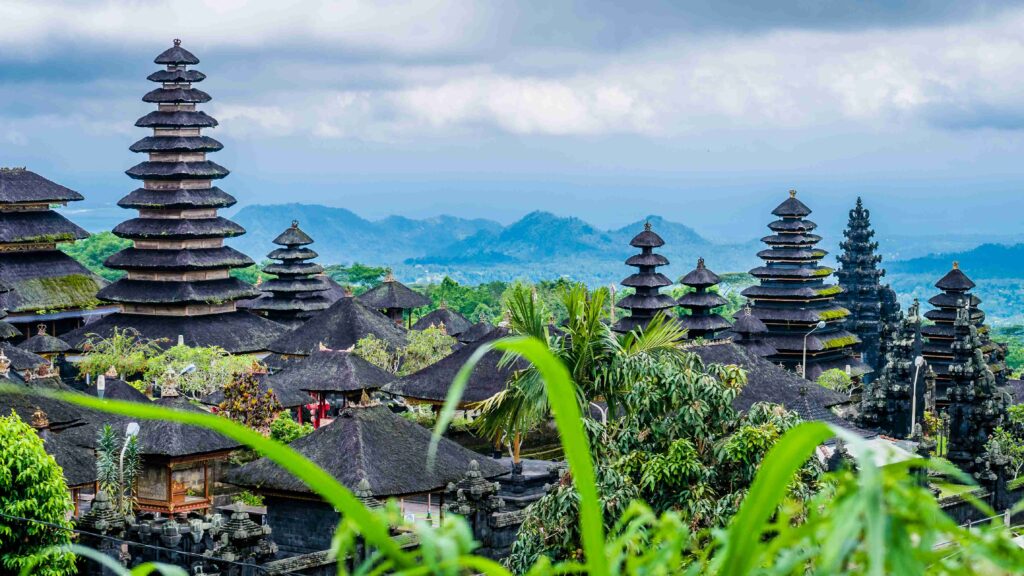
The Ethics Of Balinese Hinduism
The ethics of the Hindu faith are passed on from father to son, mother to child and from elders at the village temples to the whole community.
That means that there is a certain amount of growth in the religion here in Bali and the way that it is practiced and it is fluid enough to accept the inevitable change that goes on around it.
There is a lot of emphasis on ethical behaviour and purification if one fails to behave in an ethical manner.
The Cycle Of Birth & Life And The Gods
One unusual aspect of the local Hinduism in Bali is that there are thirteen ceremonies carried out between birth and death and much of these rites are based in the local animistic tradition.
Each newborn child in Bali is said to bring the soul of an ancestor to Earth with them as a guardian and that baby is seen as a god for the first 6 weeks of its life.
Oddly, during this period, its mother is considered to be impure and may not visit the village temple or take part in any religious act.
Babies in Bali are not allowed to touch the ground before they are 105 days old as it’s believed that this will help save them from evil spirits and maintain their pure soul.
Balinese also believe that after death, the body must be burned entirely, before the spirit can reunite with the island’s gods.
Burials here are, thus, temporary things, until a family can raise the necessary funds for a cremation.
Festivals In Bali And Their Relationships To The Gods
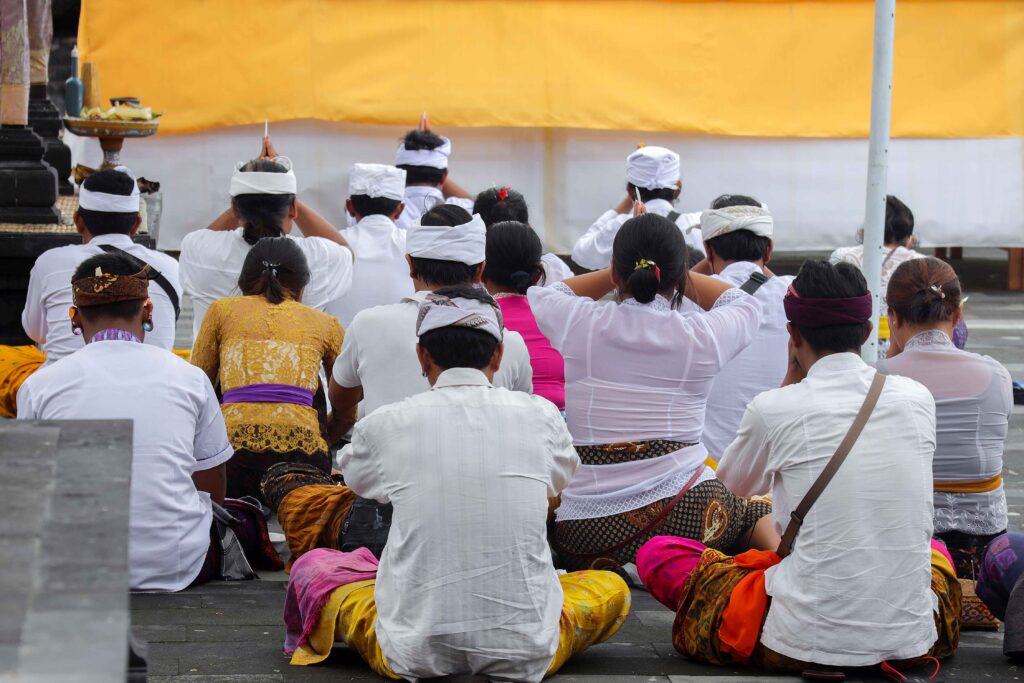
There are quite a few different festivals and rites in Bali regarding gods but there are four main ones:
Galungun – celebrating the victor of good actions by the gods over evil
Deepavali – part of the same process as Galungun and the day of ultimate triumph over evil and darkness
Nyepi – the day of silence, when Balinese people use statues called Ogoh Ogoh to trick evil spirits into coming to and then leaving Bali disappointed
Watugunung – a day devoted to the goddess of learning, Saraswati, oddly, believers are not allowed to read on this day
Festival dates change on an annual basis in Bali due to the Balinese calendar having only 210 days.
FAQs
Who Are The Gods Of Bali?
While, officially, there is only one God of Balinese Hinduism and all the other gods are simply manifestations of that one god, you’re more likely to encounter the manifestations than to encounter Ida Sanghyang Widhi Wasa.
Thus the main gods of Bali are the Hindu deities Dewa Brahma, Dewa Vishnu, Dewa Shiva, Dewi Durga, Bhoma, Dewa Ganesha, Dewi Danu, as well as Allah, Buddha, Confucious and Chen Fu Zhen Ren.
Are Balinese Hindu Or Buddhist?
Balinese people are Hindus. However, the local version of Hinduism holds the Boddhisatva (the Buddhist saints) in high regard and there are many Buddhist influences in the faith here.
This is the reverse of many other parts of Southeast Asia such as Thailand, Myanmar, Laos and Cambodia where Buddhism is the dominant faith but Hindu Gods play a large part in the local religious festivals and practices.
Interestingly, both the Hindus of Bali and the Buddhists of other parts of Southeast Asia incorporate ancestor worship into their beliefs.
Ancestor worship was the dominant faith across Southeast Asia and East Asia during ancient times (and indeed, you can find ancestor worship in other cultures across the globe) and if you look carefully you can find evidence of it everywhere – particularly in the “spirit houses” outside of many temples, homes and businesses.
What Is The Mythical Creature In Bali?
There are many mythical creatures in Balinese folklore and, perhaps, the best known is the Barong, the King of the Spirits.
This is a creature like a panther that protects the people from the demon Queen Rangda.
Who Is The Balinese God Of The Afterlife?
There are two gods of the afterlife in Bali. The goddess Setesuyara and the god Batara Kala.
Between them they created the light and the Earth and their dominion is over all that depart these planes.
Why Is Bali Known As The Land Of Gods?
While Balinese culture certainly pays respect to a fair number of gods, Balinese people don’t worship as many gods as many other faiths around the world.
However, it’s fair to say that the gods of Bali play an unusually clear part in the local culture and that there are over 20,000 temples here in Bali which might have led people to assume there are more gods here than there actually are.
What Are The Spiritual Beliefs Of Bali?
Bali practices a unique form of Indonesian Hinduism which incorporates Hindu beliefs, many Hindu gods, Buddhist saints and some of the local animist faith too.
This is in stark contrast to the rest of the archipelago which practices Islam.
Who Is The Goddess Of The Sea In Bali?
The Goddess of Water (Sea God) in Bali is Dewi Danu. In the original Balinese traditions, she was one of two supreme deities on the island.
However, in order to accommodate the insistence that all faiths in Bali become monotheistic, she is no longer considered to be one of the supreme deities and, instead, occupies an important position in the pantheon of gods that form the supreme deity.
Final Thoughts On Gods In Balinese Culture
Balinese culture and the Balinese people are a complex thing to understand and it would take more than a brief article to explain the importance of the gods here on the island.
However, you should now be aware of the most important deities and the part that they play in society here.
Most of all, you can see that by paying respect to the temples and the gods inside them, you’re respecting the Balinese people in turn.

